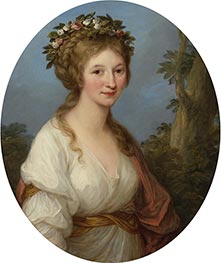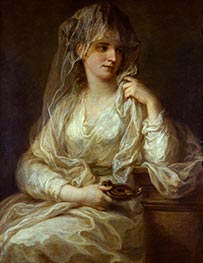
Angelica Kauffmann Painting Reproductions 1 of 1
1741-1807
Swiss Neoclassical Painter
Angelica Kauffman was one of those rare artists whose life was as captivating as her work. Born in Switzerland in 1741, Kauffman displayed prodigious talent in both painting and music from a young age. Her upbringing, guided by her father, Johann Joseph Kauffman, encouraged both artistic pursuits and an unusually broad education for a woman of her time. Fluent in four languages and possessing a fine soprano voice, she found herself at a crossroads between music and painting - a dilemma she later immortalized in her famous self-portrait, "Hesitating Between the Arts of Music and Painting."
It was painting, however, that ultimately captured her heart. Kauffman’s early success as a portraitist in Austria and Italy during her teenage years paved the way for an illustrious career. Following her mother’s death, she devoted herself entirely to art, moving to Italy in the late 1750s to study the Old Masters. She worked tirelessly, copying paintings for wealthy British Grand Tourists, and studying in the collections of Milan, Rome, and Naples. Her ambition was nothing short of revolutionary for a woman in the 18th century - she aspired to succeed in the genre of history painting, the most prestigious and male-dominated field of the time.
In 1766, Kauffman arrived in London, where her career truly took off. Known for her charm, intelligence, and undeniable talent, she quickly became one of the most sought-after portraitists in the city. Her connections with English nobility and royal patrons, including commissions for portraits of female royalty, cemented her status as a leading figure in the art world. In 1768, she was elected as one of the founding members of the Royal Academy, one of only two women among the original 22 members - an extraordinary achievement for the period.
But Kauffman’s talents extended beyond portraiture. Her graceful, neoclassical scenes, often drawn from literary and mythological sources, resonated with the sentiments of the time. Works like "Ariadne" and "Calypso" reflected the growing fashion for sensibility and became popular across Europe through reproductions. These engraved prints spread her fame far beyond her elite clientele, allowing her work to enter homes and salons across the continent.
In 1781, after her ill-fated first marriage and subsequent second marriage to Venetian painter Antonio Zucchi, Kauffman left London to settle in Rome. There, her salon became a hub for the intellectual elite, including figures like Goethe and Herder. She continued to paint, receiving commissions from aristocrats and royalty alike, including the grand ceiling paintings for Somerset House, one of her crowning achievements.
When Kauffman died in 1807, her funeral in Rome was a grand affair, likened to that of Raphael. Her bust was placed alongside his in the Pantheon - a fitting tribute to a woman who had broken boundaries, defied conventions, and carved her place in art history. Kauffman’s legacy as a pioneer for women in the arts endures, and her life remains a testament to the power of quiet tenacity in a world that was not yet ready for her brilliance.
It was painting, however, that ultimately captured her heart. Kauffman’s early success as a portraitist in Austria and Italy during her teenage years paved the way for an illustrious career. Following her mother’s death, she devoted herself entirely to art, moving to Italy in the late 1750s to study the Old Masters. She worked tirelessly, copying paintings for wealthy British Grand Tourists, and studying in the collections of Milan, Rome, and Naples. Her ambition was nothing short of revolutionary for a woman in the 18th century - she aspired to succeed in the genre of history painting, the most prestigious and male-dominated field of the time.
In 1766, Kauffman arrived in London, where her career truly took off. Known for her charm, intelligence, and undeniable talent, she quickly became one of the most sought-after portraitists in the city. Her connections with English nobility and royal patrons, including commissions for portraits of female royalty, cemented her status as a leading figure in the art world. In 1768, she was elected as one of the founding members of the Royal Academy, one of only two women among the original 22 members - an extraordinary achievement for the period.
But Kauffman’s talents extended beyond portraiture. Her graceful, neoclassical scenes, often drawn from literary and mythological sources, resonated with the sentiments of the time. Works like "Ariadne" and "Calypso" reflected the growing fashion for sensibility and became popular across Europe through reproductions. These engraved prints spread her fame far beyond her elite clientele, allowing her work to enter homes and salons across the continent.
In 1781, after her ill-fated first marriage and subsequent second marriage to Venetian painter Antonio Zucchi, Kauffman left London to settle in Rome. There, her salon became a hub for the intellectual elite, including figures like Goethe and Herder. She continued to paint, receiving commissions from aristocrats and royalty alike, including the grand ceiling paintings for Somerset House, one of her crowning achievements.
When Kauffman died in 1807, her funeral in Rome was a grand affair, likened to that of Raphael. Her bust was placed alongside his in the Pantheon - a fitting tribute to a woman who had broken boundaries, defied conventions, and carved her place in art history. Kauffman’s legacy as a pioneer for women in the arts endures, and her life remains a testament to the power of quiet tenacity in a world that was not yet ready for her brilliance.
2 Angelica Kauffmann Paintings

Portrait of a Young Woman (Anna Charlotta ... 1785
Oil Painting
$1625
$1625
Canvas Print
$64.60
$64.60
SKU: KAA-18007
Angelica Kauffmann
Original Size: 76.8 x 63.5 cm
Private Collection
Angelica Kauffmann
Original Size: 76.8 x 63.5 cm
Private Collection

Portrait of a Lady as a Vestal Virgin c.1781/82
Oil Painting
$1263
$1263
Canvas Print
$59.30
$59.30
SKU: KAA-18854
Angelica Kauffmann
Original Size: 91.5 x 71.5 cm
Gemaldegalerie Alte Meister, Dresden, Germany
Angelica Kauffmann
Original Size: 91.5 x 71.5 cm
Gemaldegalerie Alte Meister, Dresden, Germany